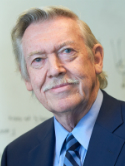Tumor‐necrosis factor induces cell cycle arrest in multipotential hematopoietic stem cells: A possible radioprotective mechanism Journal Article
| Authors: | Warren, D. J.; Slørdal, L.; Moore, M. A. S. |
| Article Title: | Tumor‐necrosis factor induces cell cycle arrest in multipotential hematopoietic stem cells: A possible radioprotective mechanism |
| Abstract: | Tumor‐necrosis factor (TNF) and interleukin‐1 (IL‐1) have been shown to confer protection of hematopoiesis in mice challenged with radiation. Herein, a series of experiments designed to elucidate the underlying mechanism is presented. After TNF administration, colony‐stimulating activity, but no IL‐1 activity, was detectable in mouse plasma. In endogenous CFU‐S assays, TNF enhanced the survival of multipotential progenitors when administered before, but not after, irradiation. In experiments with fractionated irradiation, the radioprotective effect of TNF was distinctly different from that of IL‐1. In vivo and in vitro thymidine suicide assays demonstrated that TNF wholly or partially abolished cell cycling of the CFU‐S hematopoietic compartment. These data imply that TNF may inhibit the cell cycle in hematopoietic progenitor cell populations. © Munksgaard 1990 |
| Keywords: | nonhuman; mouse; animal; mice; cells, cultured; cell cycle; interleukin 1beta; animal experiment; mice, inbred balb c; tnf; tumor necrosis factor alpha; recombinant proteins; irradiation; hematopoietic stem cells; radiation-protective agents; hematopoiesis; colony-forming units assay; colony-stimulating factors; thymidine; tumor necrosis factor; radiation protection; interleukin-1; article; support, non-u.s. gov't; support, u.s. gov't, p.h.s. |
| Journal Title: | European Journal of Haematology |
| Volume: | 45 |
| Issue: | 3 |
| ISSN: | 0902-4441 |
| Publisher: | John Wiley & Sons |
| Date Published: | 1990-09-01 |
| Start Page: | 158 |
| End Page: | 163 |
| Language: | English |
| DOI: | 10.1111/j.1600-0609.1990.tb00444.x |
| PUBMED: | 2226728 |
| PROVIDER: | scopus |
| DOI/URL: | |
| Notes: | Source: Scopus |
Altmetric
Citation Impact
BMJ Impact Analytics
Related MSK Work




